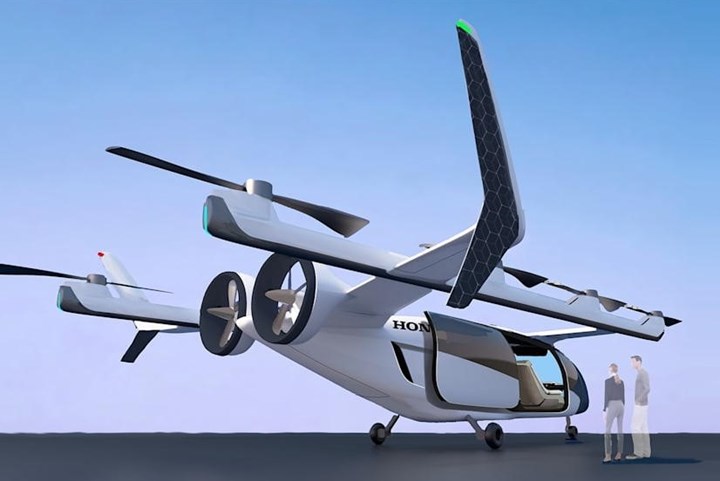Honda announces plans for hybrid eVTOL aircraft
Entering the eVTOL market, Honda reveals new aircraft concept with a gas turbine hybrid power unit for up to 400 kilometers intercity travel range. Flight tests of demonstration model are set for 2025.

Honda’s artistic rendering of its eVTOL concept aircraft. Photo Credit: Honda
On Sept. 30, automotive company Honda introduced its initiative to enter new markets, including its plan to join the ranks of aerospace and auto manufacturers targeting advanced air mobility (AAM) and electric takeoff and landing (eVTOL) aircraft. With this announcement, the company unveiled its hybrid-electric aircraft concept for long-range, intercity travel, a research project that is being spearheaded by its subsidiary, Honda R&D Co.
In the press release, the company acknowledges the growing eVTOL field, involving a myriad of aerospace companies and tech startups, along with Toyota and Hyundai, but believes it can differentiate from them with the use of a gas turbine hybrid power unit that will reportedly provide a longer range and provide up to 400 kilometers (the current all-electric range is 100 kilometers) for intercity transportation. The company contends that the only “realistic” use case for all-electric air taxis today is intracity transportation, due to current battery limitations.
While Honda did not provide details on the aircraft, depictions show a lift-plus-cruise design with eight lifting propellors on parallel booms and two ducted propellors in the rear (shown above). Honda plans to leverage its expertise in areas such as combustion, aerodynamics and control technologies. Further, eVTOL notes that Honda’s experience developing the HondaJet and its HF120 turbofan engine will inform its approach to turbine technology, aerodynamics, lightweight structure manufacturing and aircraft certification.
Along with the eVTOL and a hybrid power unit, Honda also outlines a vision for a transportation ecosystem involving the use of strategically stationed “Honda Mobility Hubs” to serve as base locations connecting various cities. This ecosystem could involve electric and autonomous ground transportation as well.
According to TechCrunch, the company is working toward flight tests of a hybrid demonstration model in 2025, after which it will make a decision on commercialization.
This information was compiled from eVTOL, TechCrunch and the Rotorcraft Asia-Pacific e-newsletter.
Related Content
-
Paris Air Show 2023 highlights
The Paris Air Show, one of the largest aerospace trade shows in the world, returned for the first time since 2019 and proved that the global aviation industry industry is very much alive and kicking.
-
Plant tour: Joby Aviation, Marina, Calif., U.S.
As the advanced air mobility market begins to take shape, market leader Joby Aviation works to industrialize composites manufacturing for its first-generation, composites-intensive, all-electric air taxi.
-
Alef Aeronautics earns FAA approval to launch flying car
FAA certifies testing of California startup Alef’s all-electric composite vehicle, which is drivable on public roads and has VTOL capabilities.

















